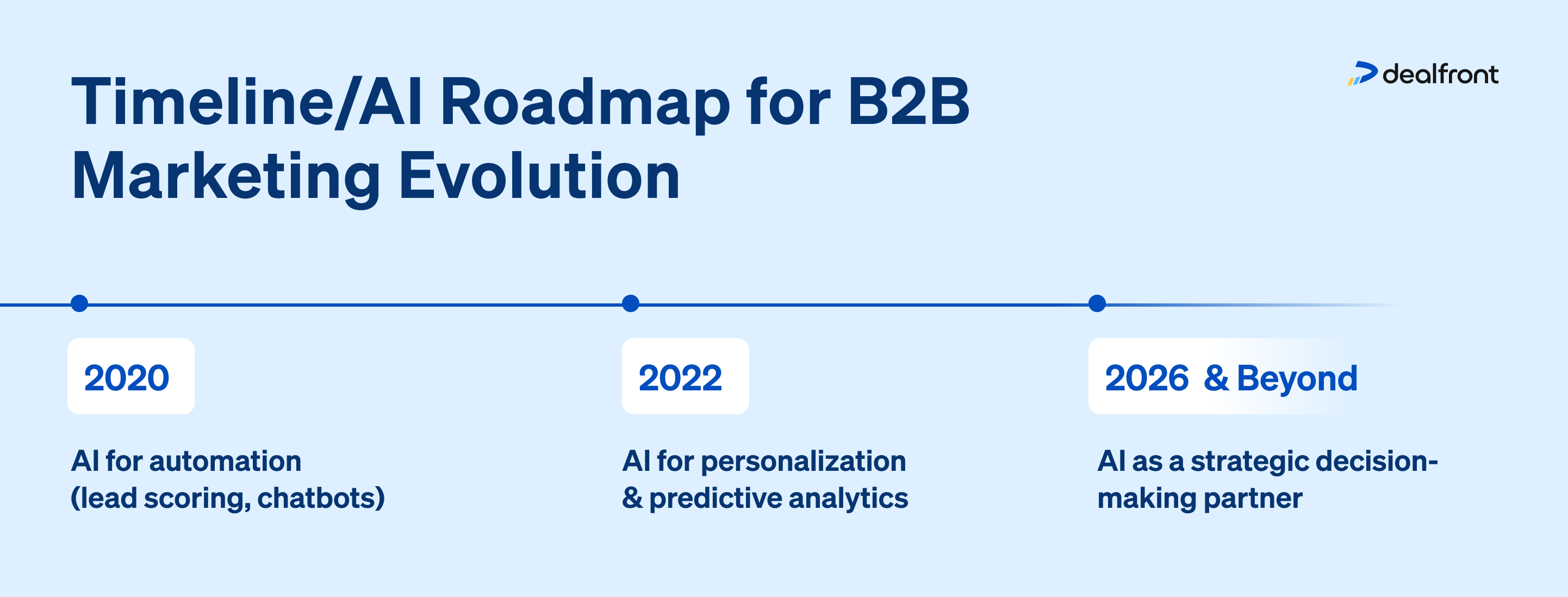Why AI Automation For B2B is key to agile business processes
Wiki Article
Unlock Performance and Development With AI Automation for B2B Firms
AI automation is changing the landscape for B2B business. It improves procedures and decreases dependence on human intervention. This change permits organizations to make quicker, data-driven decisions. As companies check out which processes to automate, they must likewise think about the right tools to implement. Nonetheless, obstacles continue to be in taking on AI innovation. Minarik AI. The implications of these adjustments could form the future of lots of companies in ways yet to be completely understoodUnderstanding AI Automation in the B2B Context
As organizations increasingly seek effectiveness, understanding AI automation in the B2B context becomes vital. AI automation includes using sophisticated innovations to simplify operations, lower human intervention, and enhance decision-making procedures. In the B2B landscape, this can manifest in different kinds, such as automating customer support interactions, taking care of supply chain logistics, or maximizing marketing campaigns. Companies can utilize AI to assess enormous datasets promptly, enabling them to recognize trends and understandings that educate strategic choices. Furthermore, AI systems can incorporate flawlessly with existing technologies, offering a cohesive system for taking care of company features. This understanding prepares for organizations to explore how AI can transform their operations, improve productivity, and eventually foster sustainable growth in an affordable market.Secret Advantages of Executing AI Automation

Recognizing Processes Appropriate for Automation

Selecting the Right AI Devices for Your Service
When B2B companies take into consideration automating their procedures, picking the best AI devices ends up being vital for attaining wanted outcomes. Business should begin by assessing their distinct needs and goals, ensuring positioning with service goals (Minarik AI). Reviewing the flexibility, combination, and scalability abilities of possible devices is essential, as these aspects identify long-term performance. Organizations should additionally consider user-friendliness and the level of support supplied by suppliers, as these components can impact effective implementation. On top of that, evaluating client evaluations and study can offer insights into exactly how specific AI services execute in real-world scenarios. By meticulously selecting AI tools that fit their functional needs, B2B business can enhance effectiveness and drive development while decreasing possible interruptionsGetting Over Obstacles in AI Fostering
B2B business commonly come across considerable obstacles in taking on AI innovations, especially issues connected to information high quality and resistance to alter management. Poor information high quality can hinder the effectiveness of AI systems, while staff member hesitation to welcome new procedures can delay implementation initiatives - Growth Systems For B2B. Resolving these difficulties is vital for successful AI assimilation and maximizing its possible benefitsInformation Top Quality Issues
Assuring high data quality is essential for the successful adoption of AI modern technologies in business-to-business atmospheres. Inaccurate, insufficient, or outdated information can significantly hinder AI efforts, leading to wrong understandings and poor decision-making. Business often deal with challenges such as data silos, disparities throughout different sources, and an absence of standardized data layouts. To get rid of these concerns, organizations need to buy data cleaning, combination, and governance processes. Implementing durable data management methods ensures that the details fed into AI systems is appropriate and trustworthy. Furthermore, promoting a society of data high quality recognition amongst employees can enhance data precision in time. By addressing information top quality concerns, B2B companies can release the complete possibility of AI automation, driving efficiency and development.Change Management Resistance

Determining the Influence of AI Automation
Gauging the impact of AI automation in B2B business needs a clear understanding of key performance signs (KPIs) that straighten with organization objectives. Reliable data analysis methods are crucial for interpreting the results, while robust ROI analysis strategies help identify the financial benefits of automation efforts. Together, these parts provide a substantial structure for examining AI's payments to business success.Key Performance Indicators
Secret performance signs (KPIs) serve as necessary devices for B2B business to analyze the performance of AI automation campaigns. By establishing clear metrics, organizations can measure enhancements in functional efficiency, expense decrease, and profits growth straight attributable to automation. Common KPIs consist of cycle time reduction, mistake rates, customer fulfillment ratings, and employee productivity degrees. These indications supply insights into just how AI systems are optimizing processes and improving overall efficiency. Furthermore, tracking KPIs enables business to determine areas for more enhancement and to align AI automation initiatives with calculated service objectives. Eventually, a distinct framework of KPIs guarantees that B2B business can quantitatively evaluate the impact of AI automation on their operations and drive continual development.Data Evaluation Methods
Effective information analysis strategies play an essential function in evaluating the influence of AI automation within B2B firms. By using analytical methods, companies can identify patterns and patterns in operational information, allowing them to examine the effectiveness gains accomplished via automation. Techniques such as regression analysis and time series forecasting give insights right into just how AI-driven processes affect efficiency and decision-making. Furthermore, information visualization tools can effectively communicate searchings for to stakeholders, facilitating notified critical decisions. Device understanding algorithms can additionally boost analysis by predicting future end results based upon historic data, using workable understandings. Inevitably, these strategies enable B2B firms to gauge success and optimize their AI automation initiatives, guaranteeing positioning with service goals and enhancing overall efficiency.ROI Assessment Techniques
Examining the roi (ROI) of AI automation is necessary for B2B firms looking for to recognize the economic effects of their technical efforts. Firms can utilize different ROI evaluation techniques to evaluate the effectiveness of AI applications - AI Automation For B2B. One efficient method involves calculating price financial savings by contrasting functional expenses before and after automation (AI Automation For B2B). In addition, gauging performance renovations via crucial efficiency indicators (KPIs) assists evaluate the benefits of AI. Customer complete satisfaction metrics can additionally supply insights into the effect of automation on service top quality. To ensure a comprehensive analysis, companies should take into consideration both direct monetary returns and intangible advantages, such as enhanced decision-making capacities and competitive benefit. This multifaceted evaluation makes it possible for B2B business to make enlightened decisions relating to future investments in AI innovationFuture Fads in AI Automation for B2B Business
What innovations lie in advance for AI automation in B2B firms? Emerging patterns show a substantial shift in the direction of boosted data analytics abilities, making it possible for businesses to make even more informed choices. Predictive analytics will certainly become increasingly essential, permitting firms to prepare for market adjustments and client needs. Additionally, the combination of AI with Net of Points (IoT) innovation is expected to enhance operations by giving real-time insights and automation of processes. Firms will also concentrate on boosting consumer experiences through personalized advertising and marketing driven by AI formulas. Furthermore, developments in all-natural language processing will certainly promote much better interaction in between services and clients. As these fads evolve, B2B companies need to adapt to take advantage of AI automation properly, guaranteeing continual development and competitive advantage.Often Asked Concerns
What Industries Advantage one of the most From AI Automation in B2B?
Production, finance, health care, and logistics sectors profit the most from AI automation in B2B. These markets leverage AI to maximize procedures, improve decision-making, and boost total operational efficiency, driving considerable growth and development.Exactly How Does AI Automation Influence Staff Member Duties and Responsibilities?
AI automation improves employee functions and responsibilities by improving repetitive tasks, allowing workers to concentrate on tactical campaigns. This change promotes skill advancement, improves performance, and motivates cooperation, eventually driving business growth and advancement.What Are Usual Misconceptions Concerning AI Automation in B2B?
Common mistaken beliefs about AI automation in B2B consist of concerns of task loss, beliefs that AI can fully replace human judgment, and underestimating the relevance of collaboration in between AI systems and staff members for optimal outcomes.How Can Businesses Ensure Information Personal Privacy With AI Automation?
Services can ensure data privacy with AI automation by executing durable encryption methods, sticking to regulatory visit compliance, carrying out regular audits, and training staff members on data handling practices to minimize risks and protect sensitive information.What Are the Prices Related To Executing AI Automation?
The expenses related to executing AI automation consist of software purchase, facilities upgrades, training workers, continuous maintenance, and prospective downtime during assimilation. In addition, business might sustain expenditures connected to data safety and security and compliance actions.Determining the impact of AI automation in B2B firms calls for a clear understanding of key efficiency indicators (KPIs) that line up with organization objectives. Key efficiency indicators (KPIs) offer as necessary tools for B2B business to examine the performance of AI automation initiatives. Efficient data analysis methods play an important function in evaluating the effect of AI automation within B2B firms. Evaluating the return on investment (ROI) of AI automation is essential for B2B firms looking for to recognize the monetary ramifications of their technical initiatives. What technologies lie in advance for AI automation in B2B firms?
Report this wiki page